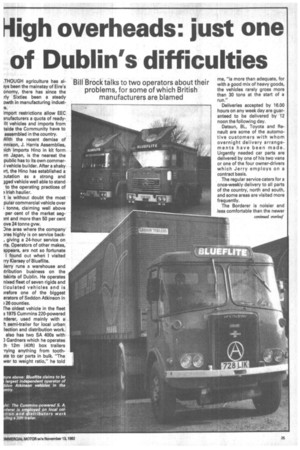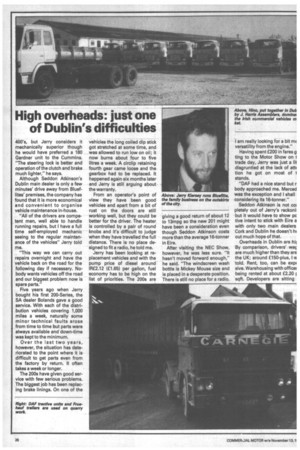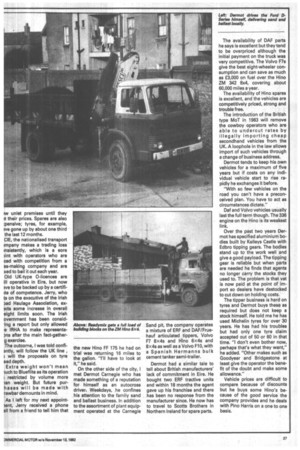High overheads: just one of Dublin's difficulties
Page 17

Page 18

Page 19

If you've noticed an error in this article please click here to report it so we can fix it.
THOUGH agriculture has aliys been the mainstay of Eire's onomy, there has since the rly Sixties been a steady owth in manufacturing industs.
Import restrictions allow EEC mufacturers a quota of readyit vehicles and imports from tside the Community have to assembled in the country. Nith the recent demise of finison, J. Harris Assemblies, lich imports Hino in kit form im Japan, is the nearest the public has to its own commeril vehicle builder. After a shaky irt, the Hino has established a )utation as a strong and gged vehicle well able to stand to the operating practices of Irish haulier.
t is without doubt the most pular commercial vehicle over i tonne, claiming well above per cent of the market segmt and more than 50 per cent eve 24 tonne gvw.
Dne area where the company Nes highly is on service back, giving a 24-hour service on rts. Operators of other makes, 3ppears, are not so fortunate I found out when I visited rry Kiersey of Blueflite.
Jerry runs a warehouse and itribution business on the tskirts of Dublin. He operates nixed fleet of seven rigids and ticulated vehicles and is Kefore one of the biggest erators of Seddon Atkinson in )26 counties.
Ihe oldest vehicle in the fleet s 1975 Cummins 220-powered rderer, used mainly with a, 't semi-trailer for local urban, lection and distribution work., also has two SA 400s with ) Gardners which he operates lh 12m (40ft) box trailers Tying anything from toothste to car parts in bulk. "The wer to weight ratio," he told
me, "is more than adequate, for with a good mix of heavy goods, the vehicles rarely gross more than 30 tons at the start of a run."
Deliveries accepted by 16.00 hours on any week day are guaranteed to be delivered by 12 noon the following day.
Datsun, BL, Toyota and Renault are some of the automotive customers with whom overnight delivery arrangements have been made. Urgently needed car parts are delivered by one of his two vans or one of the four owner-drivers which Jerry employs on a contract basis.
The regular service caters for a once-weekly delivery to all parts of the country, north and south, and some areas are visited more frequently.
The Borderer is noisier and .less comfortable than the newer continued overleaf 400's, but Jerry considers it mechanically superior though he would have preferred a 180 Gardner unit to the Cummins. "The steering lock is better and operation of the clutch and brake much lighter," he says.
Although Seddon Atkinson's Dublin main dealer is only a few minutes' drive away from Blueflites' premises, the company has found that it is more economical and convenient to organise vehicle maintenance in-house.
"All of the drivers are competent men, well able to handle running repairs, but I have a full time self-employed mechanic seeing to the regular maintenance of the vehicles" Jerry told me.
-This way we can carry out repairs overnight and have the vehicle back on the road for the following day if necessary. Nobody wants vehicles off the road and our biggest problem now is spare parts."
Five years ago when Jerry , bought his first 200-Series, the SA dealer Bolands gave a good service. With each of the distribution vehicles covering 1,000 miles a week, naturally some minor technical faults arose from time to time but parts were always available and down-time was kept to the minimum.
Over the last two years, however, the situation has deteriorated to the point where it is difficult to get parts even from the factory by return. It often takes a week or longer. • The 200s have given good service with few serious problems. The biggest job has been replacing brake linings. On one of the vehicles the long coiled dip stick got stretched at some time, and was allowed to run low on oil; it now burns about four to five litres a week. A circlip retaining fourth gear came loose and the gearbox had to be replaced. It happened again six months later and Jerry is still arguing about the warranty.
From an operator's point of view they have been good vehicles and apart from a bit of rust on the doors are still working well, but they could be better for the driver. The heater is controlled by a pair of round knobs and it's difficult to judge when they have travelled the full distance. There is no place designed to fit a radio, he told me.
Jerry has been looking at replacement vehicles and with the pump price of diesel around 1R£2.12 (£1.651 per gallon, fuel economy has to be high on the list of priorities. The 200s are giving a good return of about 12 to 13mpg so the new 201 might have been a consideration even though Seddon Atkinson costs more than the average 16-tonner in Eire.
• After visiting the NEC Show, however, he was less sure. "It hasn't moved forward enough," he said. "The windscreen wash bottle is Mickey Mouse size and is placed in a desperate position. There is still no place for a radio. I am really looking for a bit mc versatility from the engine."
Having spent £200 in fares g ting to the Motor Show on t trade day, Jerry was just a lit disgruntled at the lack of att( tion he got on most of t stands.
"DAF had a nice stand but r body approached me. Merced was the exception and I shall -considering its 16-tonner." Seddon Atkinson is not CO1 pletely out of Jerry's reckonii but it would have to show pc tive intent to stick with Eire a with only two main dealers Cork and Dublin he doesn't h( out much hope of that.
Overheads in Dublin are hii By comparison, drivers' waE are much higher than they are the UK; around £150-plus, I In told. Rent, too, can be expi sive. Warehousing with office; being rented at about £2.20 sqft. Developers are sitting unlet premises until they their prices. Spares are also ensive; tyres, for example, e gone up by about one third he last 12 months.
1E, the nationalised transport mpany makes a trading loss nsistently, which is a sore int with operators who are ad with competition from a s-making company and are ad to bail it out each year.
d UK-type 0-licences are 11 operative in Eire, but now we to be backed up by a certifiite of competence. Jerry, who ts on the executive of the Irish Dad Haulage Association, ex3cts some increase in overall eight limits soon. The Irish overnment has been consid.3
ng a report but only allowed 1 IRHA to make representans after the main fact-gatherexercise.
he outcome, I was told confintly, will follow the UK line , will the proposals on tyre ad depth.
Extra weight won't mean uch to Blueflite as its operation i restricted by volume more an weight. But future purases will be made with awbar demounts in mind.
As I left for my next appointant, Jerry received a phone all from a friend to tell him that the new Hino FF 175 he had on trial was returning 16 miles to the gallon. "I'll have to look at it," he said.
On the other side of the city, I met Dermot Carnegie who has made something of a reputation for himself as an autocross driver. Weekdays, he confines his attention to the family sand and ballast business. In addition to the assortment of plant equipment operated at the Carnegie
Sand pit, the company operates a mixture of ERF and OAF/Fruehauf articulated tippers, Volvo F7 8x 4s and Nino 6 X 4s and 8 x4s as well as a Volvo Fl 0, with a Spanish Hermanns bulk cement tanker semi-trailer.
Dermot had a similar tale to tell about British manufacturers' lack of commitment in Eire. He bought two ERF tractive units and within 18 months the agent gave up his franchise and there has been no response from the manufacturer since. He now has to travel to Scotts Brothers in Northern Ireland for spare parts. The availability of OAF parts he says is excellent but they tend to be overpriced although the initial payment on the truck was very competitive. The Volvo F7s give the best eight-wheeler consumption and can save as much as £3,000 on fuel over the Hino ZM 342 8x4, covering about 60,000 miles a year.
The availability of Hino spares is excellent, and the vehicles are competitively priced, strong and trouble free.
The introduction of the British type MoT in 1983 will remove the cowboy operators who are able to undercut rates by illegally importing cheap secondhand vehicles from the UK. A loophole in the law allows import of such vehicles through a change of business address.
Dermot tends to keep his own vehicles for a maximum of five years but if costs on any individual vehicle start to rise rapidly he exchanges it before.
"With so few vehicles on the road you can't have a preconceived plan. You have to act as circumstances dictate."
Daf and Volvo vehicles usually last the full term though. The 336 engine on the Hino is its weakest link.
Over the past two years Dermot has specified aluminium bodies built by Kelleys Castle with Edbro tipping gears. The bodies stand up to the work well and give a good payload. The tipping gear is reliable but when parts are needed he finds that agents no longer carry the stocks they used to. The problem is that vat is now paid at the point of import so dealers have destocked to cut down on holding costs.
The tipper business is hard on tyres and Dermot buys these as required but does not keep a stock himself. He told me he has used Michelin tyres for over 30 years. He has had his troubles but had only one tyre claim accepted out of 50 or 60 in that time. "I don't even bother now, perhaps that's what they want," he added. "Other makes such as Goodyear and Bridgestone at least give the operator the benefit of the doubt and make some allowance."
Vehicle prices are difficult to compare because of discounts but he buys some Hino's because of the good service the company provides and he deals with Pino Harris on a one to one basis.












































